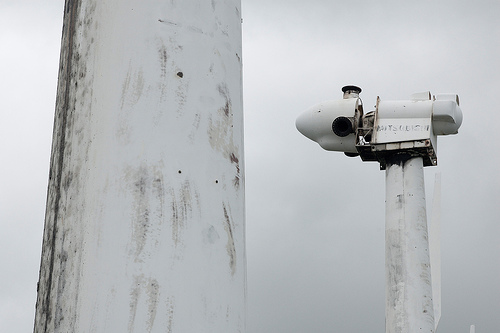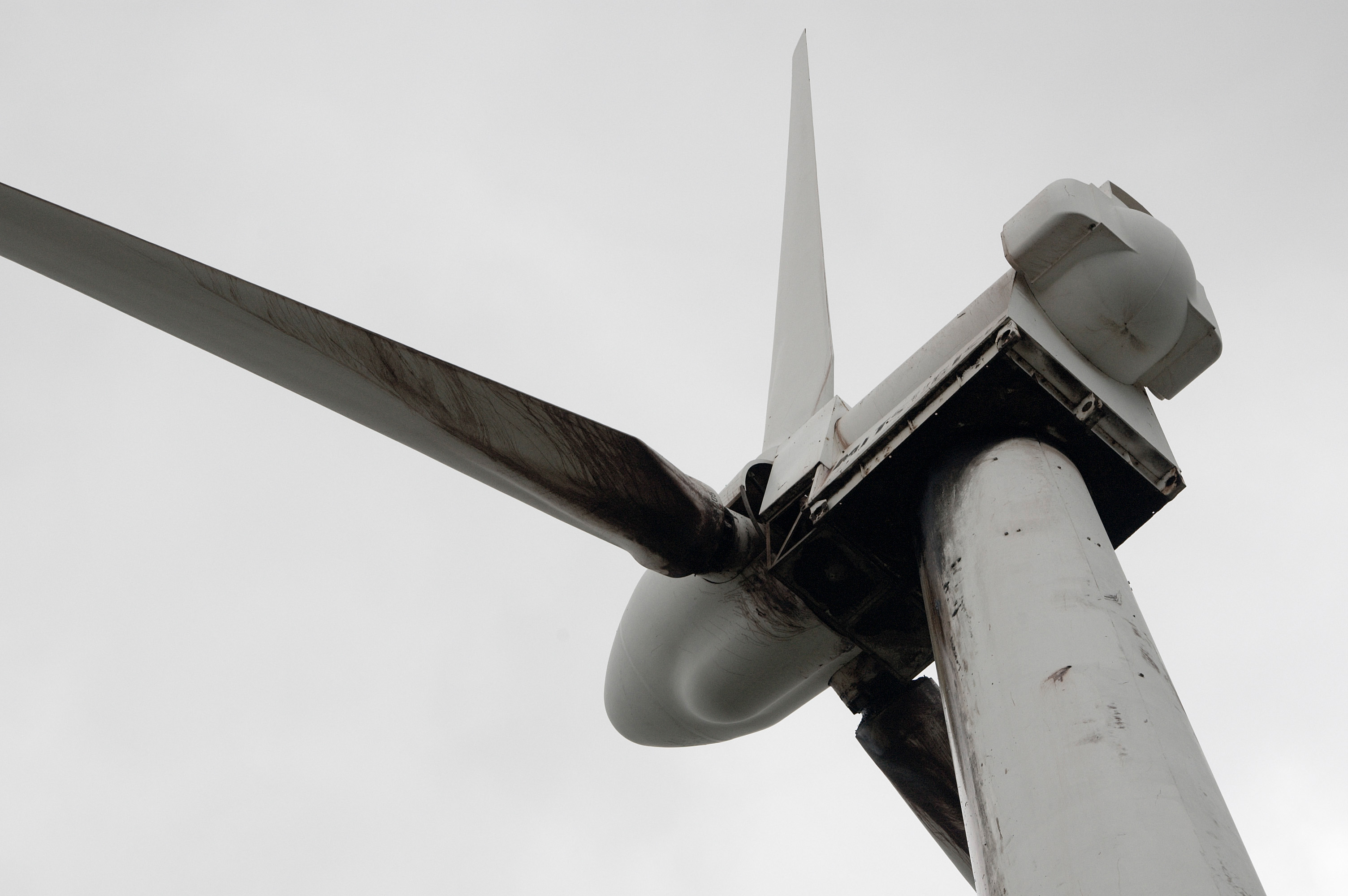Entries in wisconsin wind energy (18)
4/1/10 TRIPLE FEATURE: Brown County Health department says wind turbine health effects need looking into AND Kewanee County Town of Carlton passes large wind moritorium No Foolin'! PSC will webcast AUDIO of today's 1:30 PM WSC Meeting!
PANEL ASKS FOR WIND TURBINE HEALTH STUDY
Source: Green Bay Press-Gazette, www.greenbaypressgazette.com
April 1, 2010
By Tony Walter,
The Brown County Health Department will look into the impact of wind turbines on human health.
Supervisor Patrick Evans, chairman of the Human Services committee, said he thinks the turbines proposed for southern Brown County pose a potential health danger and wants a study conducted.
“I feel there’s a health risk right now,” said Evans, who said he has done wind turbine consulting in Brazil and has health data compiled in European countries where the turbines have been built. “The only way that wind farms in southern Brown County can be stopped is through the health department.”
Chicago-based Invenergy LLC has proposed building 100 wind turbines in the area, with 54 of them in the town of Morrison. Opponents argue that the turbines would deflate land values and create health problems through noise and interference with the groundwater.
The Wisconsin Public Service Commission has authority to approve the turbines but hasn’t yet acted on the company’s request.
Evans said the health department study would be presented to the Board of Health, the Human Services committee and the County Board.
Health Department Director Judy Friederichs said she was planning to investigate the health danger anyway.
“We decided to be proactive after reading many of the comments,” Friederichs said. “But we really haven’t had a speaker on this at any of the state meetings. So we’re just starting to look into it.”
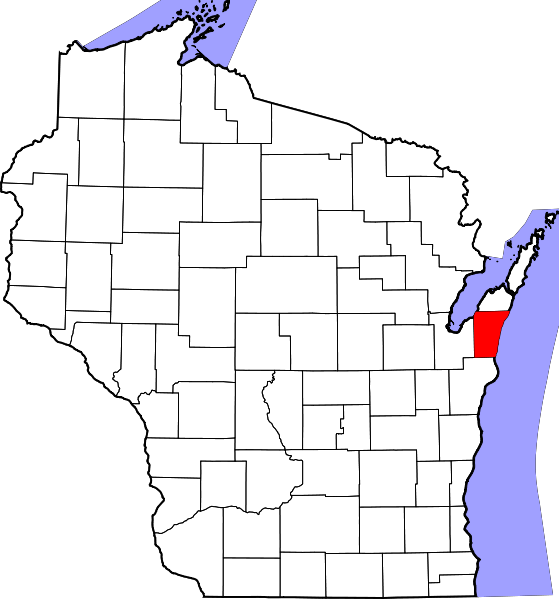
Carlton Wind moratorium approved: Residents seek to protect property rights
SOURCE Kewaunee County News, www.greenbaypressgazette.com
By Kurt Rentmeester,
March 31 2010
The Carlton Town Board approved a one-year moratorium on commercial wind turbines Monday, after more than 50 residents came to a public hearing to oppose the idea.
The board unanimously approved the measure on a 3-0 vote after Town Chairman Dave Hardtke said he received six or seven phone calls from residents who were contacted by the Ohio-based Element Energy to lease their property for wind generation.
Element Energy seeks to lease more than 18,000 acres for 111 commercial turbines as part of a wind farm between Kewaunee and Two Rivers. Wind turbines would be built on properties in the towns of West Kewaunee, Two Creeks, Mishicot and Two Rivers.
Property owners elsewhere have lost rights after signing lease agreements to site wind turbines on their land, according to Jeff Roberts, a town of Mishicot resident. Turbines have had an impact on cell phone and TV reception.
Carlton residents could have concerns if people in neighboring towns agree to the Element Energy proposal, Carlton Town Supervisor Steve Tadisch said. A state wind energy ordinance proposal may supersede state and county setback ordinances, he said.
Residents who sign leases may not realize they could lose their rights as property owners, said Jeff Roberts, a town of Mishicot resident. They also could lose their cell phone and TV reception, as well as have to live with the noise of turbines.
Gary Holly, a town of Carlton resident, learned Fond du Lac County residents lost some of their rights after talking to them last week.
He described one property owner who signed a waiver agreement to permit a wind turbine near his home as someone who “looked down. He was a beaten man.”
Lynn Holly, a business operator from the Tisch Mills area, said she learned about the issue two weeks ago. Property owners who sign contracts cannot discuss the issue with anyone, she said.
Until now, the state has had to go through local town zoning ordinances to site wind turbines. But the Wisconsin Legislature could give power companies the right to set those standards, according to Jerome Hlinak, a town of Mishicot resident. He is a member of Wisconsin Independent Citizens Opposed to Wind Turbine Sites (WIND COWS).
Town of Carlton residents need time to understand all the concerns associated with wind turbines, said Rick Phillips, a town resident.
While the Wisconsin Legislature has mandated exploration of renewable energy, he referred to the state’s efforts as a “knee-jerk reaction” that needs to be thought out.
Green energy grants that power companies are eligible for can be pulled, Hardtke said. Property owners then can lose money, too.
When people sign lease agreements for wind power, Becky Paplham said they should consider the long-term impact on residents with young families.
A state initiative on wind energy could be established to override any town or county ordinances. While Manitowoc County has a 1,000-foot zoning setback, the state could eliminate that.
Hlinak wants people to be concerned about changes in state law that could eliminate county, town and individual property rights.
“I feel we’re losing local control in our township with the state Public Service Commission and the Legislature stepping in,” Hardtke said. “They don’t care how it affects us here.”
SECOND FEATURE:

Sad because you can't make it to Public Service Commssion in Madison to attend the Wind Siting Council meetings as they to put together guidelines to site industrial scale wind turbines in our state?
 Be Happy! The PSC is webcasting the AUDIO proceedings live from the Flambeau River Room. The meeting begins at 1:30 PM and is open to the public. We'd much prefer video but we'll take the audio.
Be Happy! The PSC is webcasting the AUDIO proceedings live from the Flambeau River Room. The meeting begins at 1:30 PM and is open to the public. We'd much prefer video but we'll take the audio.
Topic of the day:-Developing guiding principles- Developer/owner responsibility
Public Service Commission Building
610 North Whitney Way, Madison, Wisconsin
Flambeau River Room
CLICK HERE to download a copy of the agenda
DO YOUR HOMEWORK! CLICK HERE to find out who is on the siting council
Wind Siting Council Meeting Live Broadcast
April 1, 2010 Beginning at 1:30 p.m.
Click Here to receive the LIVE AUDIO broadcast of the Wind Siting Council Meeting
The meeting begins at 1:30 but you may want to set up your connection earlier to make sure it's ready.
If the link doesn't work, go directly to the PSC homepage by CLICKING HERE and then clicking on the "PSC Live Broadcasts button" on the left.
|
FROM THE PSC WEBSITE about live broadcasts : PSC Live offers real-time broadcasts of the Commission's open meetings and public hearings. Commission meetings and public hearings held in the Amnicon Falls room include audio and video whereas events held in the third floor Flambeau River conference room will be audio only. |
| Note: There will be no broadcast if the event is not in session. We suggest that you tune in a few minutes before the session begins and close your media player when the session ends. |
3/20/10 DOUBLE FEATURE: What an Illinois farming family is saying to the wind developers AND Wisconsin Big Industry is saying about Wisconsin Big Wind.
SOURCE: Bureau County Republican,
Ann Burkey Brezinski
March 17, 2010
I am writing on behalf of Eileen Burkey’s and the late Willard Burkey’s farm located north of Walnut. My great-grandparents purchased and moved to this property in the 1890s.
Since that time, my family has been devoted and faithful caretakers of this acreage. Further, we intend to continue this stewardship for future generations of our family, not just for the benefit of our family but because it is the right thing to do. We are the beneficiaries of a limited, endangered resource that should not be sacrificed.
We will not sign the Wind Project Lease Agreement for four, irrefutable reasons.
First, we will not diminish our tillable acres — either by area or by productivity. To do otherwise is both short-sighted and irresponsible. A wind turbine and its access roadways would decrease our tillable acres. The productivity of the soil would be diminished by compaction and damage to the farm tile system.
Second, we will not sign a contract that provides unilateral “sole discretion” in a LaSalle Street, Chicago limited liability corporate tenant regarding numerous matters concerning our family farm. We are obviously in this for the long haul and will not let our property be irrevocably abused and controlled by outsiders for their financial gain.
Third, the proposed Wind Project Lease Agreement is extremely protective of the wind turbine company, and it does not afford the farm owner the same legal protections. My professional reservations include the potential 70-year duration of the lease and its ramifications upon future generations.
It is impossible to predict the financial viability of the developer or its successors for that time period, or even to gauge the reasonableness of the terms for such a time period. Also, the lease’s list of easement effects will affect the quality of life of anyone in the vicinity of the turbines; this list includes everything from sound pollution to visual blight to air turbulence to radio-frequency interference, to name a few.
I question whether the proposed payment structure is sufficient to compensate for this open-ended list. Further, the lease terms provide that a landowner cannot construct any structure anywhere on his property without first meeting with the developer in order to determine a site that will not impact the developer’s rights. The overriding theme in the proposed lease is clearly the developer’s rights, not the rights of landowners.
Fourth, we are very concerned about evidence showing farmland values are lowered by the existence of neighboring wind turbines. We will not sign a contract that will detrimentally impact the farmland values of our neighbors and friends, and would hope that our neighbors and friends would have the same consideration for us.
Ann Burkey Brezinski
Current 10% Renewables Mandate Costs Too Much, Creates Unneeded Generation
Wisconsin currently has much more energy supply than it has energy demand – indeed, its excess energy supply is more than twice the amount required by law.
Unfortunately, the Public Service Commission of Wisconsin has concluded that Wisconsin’s 10% Renewable Portfolio Standard (RPS) trumps our energy needs, energy costs, and statutory conservation requirements, which effectively renders meaningless those “off ramps” that were intended to serve as a safety valve should the cost of renewable energy become too expensive.
We currently get about 5% of our statewide needs from renewable generation – and we have a long, expensive way to go to meet even the current 10% RPS. Yet we have no immediate, or even short term, need for more generation. Wisconsin is building a lot of unnecessary generation at a premium cost.
Crane Creek (2008) – Wisconsin Public Service Corporation – $251 million – 99 MW
The Commission concluded that Crane Creek was not needed until at least 2021 and that no new generation was needed until at least 2018.
The Commission models showed that a natural gas turbine was less expensive than a wind farm.
WPSC has a roughly 50% reserve margin - it already has way more energy supply than demand.
Bent Tree (2009) – Wisconsin Power and Light Company – $500 million – 200 MW
The Commission approved Bent Tree with a sales forecast that did not include WPL’s extraordinary loss of electric sales over the past year and more (General Motors, Domtar paper mill and other major energy-intensive companies).
WPL requested and received $30 million in its last rate case (Docket 6680-UR-117) for the up-front construction costs of the wind farm that has not yet put any iron in the ground.
Bent Tree was the biggest line item in a rate increase request of roughly $100 million or 10%.
Blue Sky Green Field (2007) – WE Energies – over $300 million – 145 MW
The Commission approved Blue Sky Green Field even though it expressly concluded that the energy would not be needed until around 2015 - eight years after it approved the project.
The Commission recognized that the Project was more expensive than fossil fuel generation.
The Commission approved the Project because of WE Energies need to meet its RPS mandate.
Glacier Hills (2010) – WE Energies – up to $452 million – 200 MW
The Commission concluded that WE Energies needed Glacier Hills in order to meet its RPS mandate, not because it needed more generation.
In her concurring opinion, Commission Azar recognized that WE Energies - and the state as a whole - may soon be exporting energy that it does not itself need, given “the current excess of capacity in Wisconsin.” And yet, the PSC still approved this project.
WE Energies still plans to spend over $1 billion in new projects to comply with the 10% RPS law.
A decade ago Wisconsin’s electric rates were among the lowest in the country; now, its rates are among the highest in the Midwest. These four wind projects alone will cost ratepayers at minimum $1.5 billion and they are or will soon be producing energy that Wisconsin does not currently need. The reason the Commission approved these projects was to meet the current 10% RPS mandate, and we are only at 5% statewide right now.
The Governor’s Task Force on Global Warming recommends boosting the RPS to 25 percent by 2025. Imagine what a 150% increase in RPS requirement will do to customer bills, at a time when the generation simply is not needed. We will be generation rich, yes. But cash poor.
 WANT MORE? CLICK HERE TO READ TODAY'S "WIND TURBINES IN THE NEWS"
WANT MORE? CLICK HERE TO READ TODAY'S "WIND TURBINES IN THE NEWS"
2/16/10: When you are old and out of shape.... which for industrial wind turbines means past the age of 20, but the contract with the wind developer goes on and on
CLICK HERE to read about Wind Energy's Ghosts
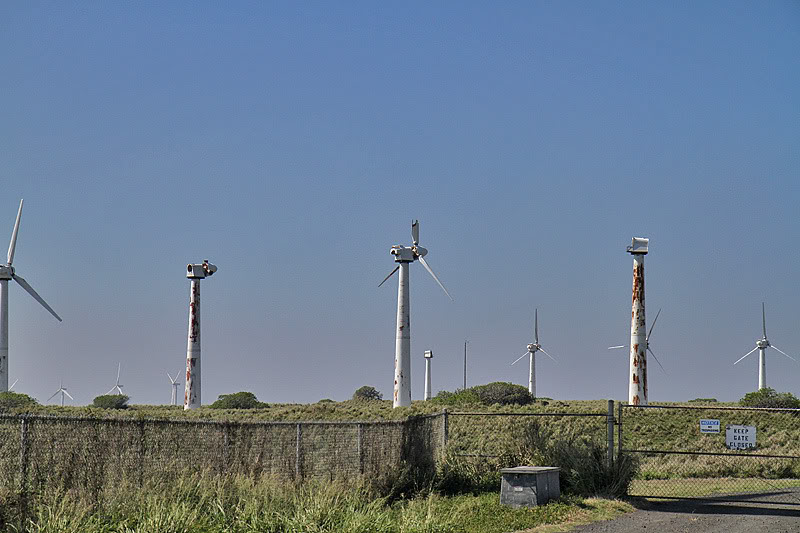
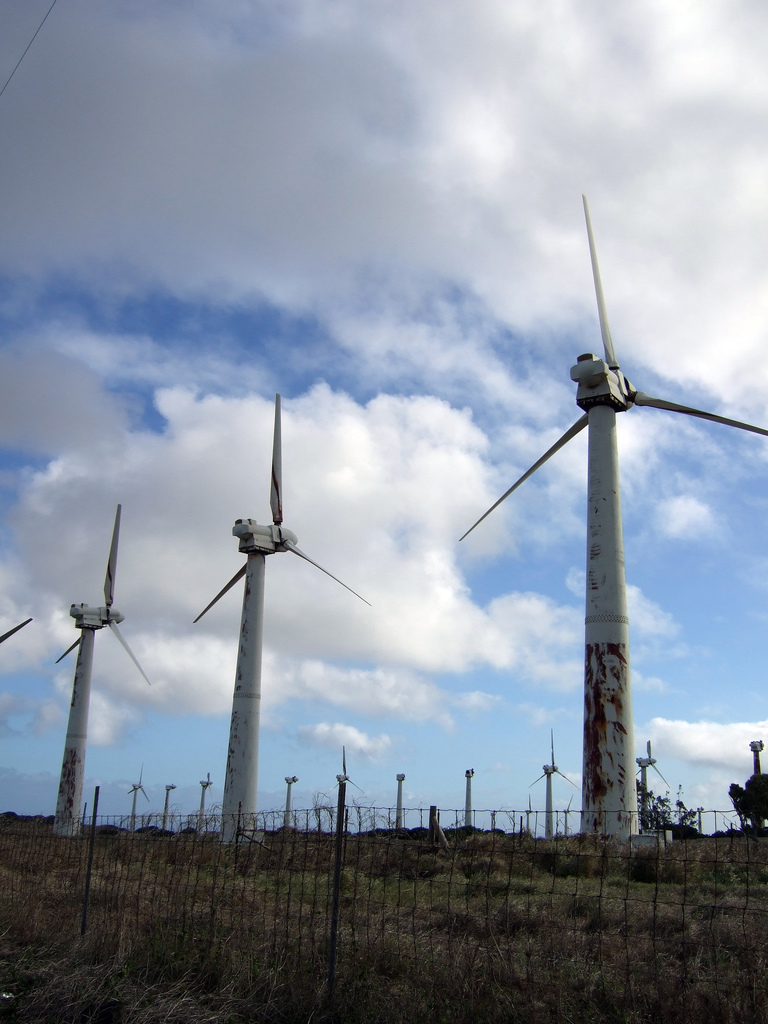
Photos of an abandoned wind farm on the island of Hawaii
